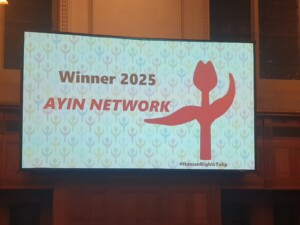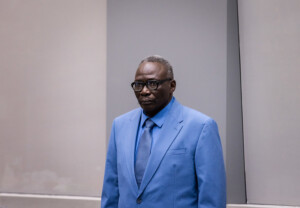Interview with Nisreen El Saim, December Revolution Kandaka and global climate activist
For Radio Dabanga’s Inspirational Women series we interviewed activist Nisreen El Saim. This climate activist and revolutionary has been a leading figure in many global and local struggles, ranging from the December Revolution in Sudan to the United Nations climate summit. She warns about the impacts of climate change for Sudan and its displaced.
 Activist Nisreen El Saim (social media)
Activist Nisreen El Saim (social media)
For Radio Dabanga’s Inspirational Women series we interviewed activist Nisreen El Saim. This climate activist and revolutionary has been a leading figure in many global and local struggles, ranging from the December Revolution in Sudan to the United Nations climate summit. She warned about the impacts of climate change for Sudan and its displaced population.
Aged just 26, she has already been Chair of the Sudan Youth Organization on Climate Change, Coordinator of Youth and Environment – Sudan (YES), member of the Pan-African Alliance for Justice Climate, junior negotiator at United Nations (UN) Climate Talks for the African Group of Negotiators, a co-organiser of the UN Youth Climate Summit, and more.
Next to being a climate activist, Nisreen has been one of the leaders of the Sudanese December Revolution and a founding member of the Association of Guardians of the Revolution. She was also one of the participants in the June 2021 Paris Conference where she was the first addressee to attract attention with her kind words and confident personality.
With her diverse activities, leadership qualities, patriotic spirit, and active personality, she enjoys a charisma that made her a leader in most of the initiatives she was a part of, even the global ones.
'I have a scientific background as well as being African, a woman, and Muslim. I am ‘all in one''
About this charisma, Nisreen explains: "I express important and topical arguments in a fiery manner… and I have a scientific background as well as being African, a woman, and Muslim. I am ‘all in one'”. “In my childhood I was described as ‘precocious’ and it is my personality that began to form since childhood, so I do not see that precociousness is a defect.”
Educational background
Twenty-six-year-old Nisreen El Saim was born in Omdurman, where she spent the first four years of her life. Then she left with her mother to live in Qatar and remained there until she completed basic school in 2009. She returned to Omdurman to complete secondary school and went on to study at the University of Khartoum’s College of Science, Department of Physics, her passion, in 2011-2017. She received a master's degree in Renewable Energy from the Faculty of Engineering at the University of Khartoum in 2018.
Beginnings of a revolutionary
At the University of Khartoum, Nisreen’s minds opened towards public work and activism. “The College of Science added a lot to me. I learned about public work due to the democratic environment at the university and I participated in my first demonstration in December 2012 when El Manaseer tribesmen protested against the construction of the Merowe Dam”.
'I participated in my first demonstration in December 2012'
That controversial dam project doubled Sudan’s electricity generation capacity but also displaced over 50,000 people, mainly from the El Manaseer tribe. Protests against the construction of the dam, and later for compensation, have been violently suppressed.
The demonstration Nisreen attended was followed by the closure of the university for three months. To become a revolutionary of the first order, the university years were a period of relentless work and activity for Nisreen. The second demonstrations she was involved with at university in 2013 were violently suppressed by authorities and led to the closure of the university for the second time.
During these years she was part of the theatre group ‘Nadous Cultural Forum’, which used drama as a means to spread awareness about political and societal issues to circumvent the political censorship at the university.

During the September 2013 revolution, Nisreen's activity expanded outside the university to participate in protests and demonstrations inside the neighbourhoods.
Throughout the years, here role in political organising grew. In 2014, she was chosen as a representative of the College of Science in the Student Central Committee, which was formed to negotiate with the university administration after the murder of student Ali Abkar.
'I did not miss a single protest march in the revolution'
During the December Revolution, the ‘Kandaka’* was untouchable. She established The Guardians of the Revolution group with her women companions and says: "I did not miss a single protest march in the revolution. I witnessed that El Shawani was shot in the El Mawrada neighbourhood”.
“We formed The Guardians of the Revolution to prepare protest materials for buildings, loudspeakers, flags, and basic requirements for marches and demonstrations. During the sit-in period, our ‘guardians’ had a tent called ‘prison tales’ from which stories were presented live for detainees inside the prison camps.
“Now the Guardians of the Revolution is an officially registered association that includes 207 women from different generations and aims to empower women and raise their capabilities for political participation and support their causes.
“We have made a map for women’s political participation and are working to implement the idea of having nurseries and kindergartens for working women. It is in the headquarters of The Guardians of the Revolution."
Introduction to climate action
During the periods of university closure and holidays Nisreen’s relentless activity continued. During the first months of the university closure in 2012, she took her first steps as an environment and climate activist by volunteering for the Sudanese Society for the Protection of the Environment.
She remembers: “an exhibition was organised for the Environmental Protection Association at the University and Dr Nader, my professor and the president of the association, encouraged me to join so I started as a volunteer.”
The ‘Young Leaders Initiative’, established by the Development Bridge Organisation and the Friedrich Ebert Foundation in 2013, was her second step during the second closure of the university. This initiative was a one-year training period to train young people as leaders and prepared Nisreen for global leadership.
Excursions were also part of the Young Leaders Initiative’s programme. Nisreen was one of two people selected to participate in the UN International Conference on Climate Change, COP22, in Morocco in 2016. This experience catapulted Nisreen into the international world.
'The first days for me were like a shower in a world I was not familiar with.'
She said: "The conference lasted for two weeks. The first days for me were like a shower in a world I was not familiar with. In halls and groups, everything related to the climate was discussed. Great personalities were present, John Kerry, Ban Ki-moon and others. For more than two days I am just trying to find my way.”
But then, Nisreen was keen to form a large network and many connections and her notable presence, her methods of raising issues, and her broad networking skills formed a starting point for her regional and international participation in climate discussions.
Her participation in the COP also opened a door to establishing the African Youth Initiative on Climate Change (AYICC) with three other young Africans. Nisreen recalled: “Within the Morocco COP, a Conference of Youth (COY) on climate change took place that included young people from different parts of the world”.
'African youth felt annoyed by the lack of focus on their issues'
“African youth felt annoyed by the lack of focus on their issues, so we decided with three Ugandan, Kenyan, and Cameroonian youths to establish an African COY, which took place for the first time in 2017 in Kampala as part of the Ugandan government’s strategy to support youth. It was an entry point for regional action.”

Negotiator and advisor to the United Nations
Such participation in global initiatives established Nisreen in the field of climate change. She made her debut as a negotiator in the Action for Climate Empowerment (ACE) conference in Bonn, Germany, in 2017, and she participated as a junior negotiator in COP24 in Katowice, Poland, in 2018.
Nisreen explains: "the negotiation process is about helping developed and developing countries to adapt to climate, how they can reduce emissions, and by what amount".
After this experience, she was nominated to be one of the 30 youth organisers of the first UN Youth Climate Summit in New York in 2019. Then she was nominated and selected to be among 7 people on the Youth Advisory Group on Climate Change of the United Nations Secretary-General in July 2020, where she is the only one from the African and Arab regions. From this group of seven young people, she was chosen to be the head of the group.
Government neglect and fears for the displaced
Zooming in on Sudan, the activist warned of the signs of climate change in the country, including the remarkable rise in temperatures and the torrential rains and floods that the country is witnessing. These effects of climate change contributed to long wars in some areas and polluted cities.
According to Nisreen, "Sudan still suffers from a lack of awareness on environmental and climate issues”. She explained that people in the countryside are more aware of climate changes through their work in agriculture and their observations of seasonal changes and rainfall rates. “They are closer to nature, they know the effects, but they do not call the changes by their scientific names; they have their own names”.
'In general, there is neither interest nor awareness at the governmental level about the environment'
“In general, there is neither interest nor awareness at the governmental level about the environment”. She explains that there is a severe lack of budget for environmental issues and adds: “We were deprived of international funding to reduce the effects of climate change because Sudan was considered a state sponsor of terrorism".
'The displaced will move from the displacement camps to the villages' camps'
Nisreen fears for the displaced population and their possibilities for return as a lot of environmental climate changes have occurred in their areas of origin. Many of their areas have become barren, "they will move from the displacement camps to the villages' camps". She also referred to the text of the Juba Peace Agreement, which included clear provisions on the environment and “should not remain an empty promise”.

Paris Conference Summit
One of the most recent involvements of El Saim was the Paris Conference on international investments and debt relief. She was chosen by the French Embassy in Khartoum as one of the young women and men active in the December Revolution. She prepared a speech for the conference, which was highly applauded.
Nisreen says: "preparing the speech was a great responsibility and meaningful experience Many considerations must be taken into account and balanced, several topics should be highlighted whilst others should be avoided. I needed to spread awareness on environmental issues and choose my language wisely, but it came out balanced, praise to God."
* Kandaka was the title of the ancient Nubian warrior queens. Symbolising strong women fighters, the term became a synonym for the women revolutionaries who played an important role in the revolution that overthrew dictator Omar Al Bashir.











 and then
and then